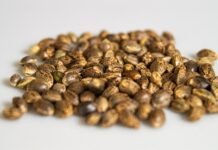There’s a time frame between whenever something starts to ache, itch, or burn and when you get to the doctor. At first, you strongly desire to ease the sensation as soon as possible without leaving your home. There are some natural home remedies that you may have and be unaware of their effects.
Some foods, herbs or oils have tens of vitamins, minerals and substances that might save you from the pain without potential adverse effects. Here are 10 home remedies and their therapeutic benefits.
1. Garlic
Raw garlic is a natural antibiotic that eases cold, flu and lung-related issues. You can find it in many articles about home remedies for various conditions from specialized websites such as Home Remedy Book. It works best if you ingest or crush it raw. Garlic contains over 70 active phytochemicals. One of them is allicin, which decreases high blood pressure, according to many studies.
Garlic decreases plaque buildup, prevents strokes, supports the immune system and has antiseptic properties. This bulb eases cough, sinusitis and works against intestinal worms.
Tip: You should eat around 5 cloves daily for maximum effects. You can mix it with parsley to eliminate its strong smell.
2. Avocado
Avocado is so nutritious that many rightfully call it a superfood. Avocado also comes with a delicious sweet taste that makes it the star of many salad or vegan cake recipes. An entire avocado contains 120 milligrams of folate and vitamin B59, which promotes cognitive and memory improvement.
Avocado decreases bad cholesterol, protects against Alzheimer’s and dementia and sustains a healthy brain function.
Tip: The secret to avocado is buying the right one. If you plan to use it immediately, purchase a ripe one. Green ones, however, can ripe in your fridge in a few days.
3. Ginger
Ginger root is a famous antioxidant which prevents stomach upset, according to several medical researches. Ginger contains vitamin C, potassium, magnesium, and copper among others. It’s also rich in substances that prevent intestinal gas.
This is one of moms’ favorite medicines for stomach by blocking serotonin. It decreases your blood pressure, arthritis pain, nausea and promotes the immune system.
Tip: Don’t use ginger if you have gallstones before consulting your doctor.
4. Peppermint
We all know that peppermint refreshes our breath and brings flavor to salads and smoothies. Besides these, it can be extremely helpful fresh or as a tea. Peppermint is an aromatic plant, so you can use it as essential oil as well.
Peppermint tea is beneficial for indigestion, wind and baby colic. As an essential oil, it has impressive benefits on relieving menstrual pain. It also eases sinusitis, asthma, wheezing and laryngitis.
Tip: By drying peppermint, you save its flavor and benefits. Its concentration doesn’t alter so, you can keep regular proportions when using it.
5. Aloe Vera
Aloe vera was initially a tropical succulent plant. Now, it is spread worldwide and intensely used for its beneficial gel that you can squeeze from the leaves. The aloe vera gel is optimal for burns, eczema and grazes and protects your skin due to its antifungal and antibacterial properties.
As mouthwash, aloe vera helps with sore gums. By swallowing the not-so-tasty gel, you can relieve constipation. This plant has proven benefits for dermatological issues. It also ameliorates infectious diseases, metastatic cancer and ulcerative colitis, according to medical studies.
Tip: Pregnant women shouldn’t take aloe vera internally. However, they can freely use it for body wounds and to keep skin from getting dry.
6. St. John’s Wort
St. John’s Wort is probably the least versatile herb from our list, but it is one of the most beneficial. This yellow flower makes an aromatic tea that is both antidepressant and anti-inflammatory. Among its substances there are hypericin and hyperforin which relieve PMS symptoms, ease depression and ameliorates obsessive compulsive disorder.
The plant also eases aggression and improves hormone balance and hormonal stimulation. You can freely drink this tea on the long term as it doesn’t have adverse effects.
Tip: Leave the leaves in the tea for less than a minute when the water is boiled. If they stay longer in the water, the tea becomes toxic and too concentrated.
7. Holy Basil
Holy or sweet basil is more than just a food spice. You may enjoy it with pesto sauce, but it also improves your mood. The herb increases adrenaline and, therefore, it quickly reduces stress. Fresh flowers are efficient for bronchitis, while the leaves ease malaria, if mixed with black pepper.
Holy basil also inhibits breast cancers and reduces blood pressure. Vitamins A and C, together with calcium, iron and zinc promote the immune system.
Tip: Fresh holy basil tea eases breast cancer treatment effects and symptoms. Consult with your doctor before engaging in drinking this tea more than once.
8. Turmeric
Turmeric is the spice used in curry. It’s rich in curcumin and flavor. This dust is famous as an Indian food product, but it’s also a powerful anti-inflammatory tool which works best against colds and flu. Turmeric also eases arthritis by having similar effects to Cox-2 inhibiting prescription drugs.
Turmeric prevents Alzheimer’s disease and colon cancer, according to clinical trials. Meanwhile, it also boosts your memory. This spice also contains quercetin, which is an antioxidant that reduces polyps.
Tip: You can add turmeric to meals whenever you have the chance to maximize its effects. The recommended use is three times a day.
9. Cinnamon
Cinnamon is a sweet and flavored spice many use in cookies and cakes. It’s health benefits make it one of the most widely spread medicinal herbs in the world. It’s a powerful antioxidant with vitamins A, B6, C, E and K, together with other active minerals.
It reduces blood sugar and, therefore, eases type 2 diabetes. Cinnamon also lowers cholesterol, reduces heart risks, protects brain function, fights infection and much more.
Tip: You can add it to fresh fruit salads or smoothies, together with peppermint for additional effects. However, don’t use it in excess as it’s intensely flavored.
10. Olive Oil
Olive oil is the heathiest alternative to regular oil in cooking. Along with a mild flavor, it also has some surprising health benefits for your heart and brain. This dietary salad oil is best used cold to keep its effects. Moreover, it contains linoleic acid which moisturizes your skin and cleans your teeth.
Externally, olive oil protects your skin from free radical, reduces under-eye wrinkles and removes dandruff. Among the medical effects of olive oil there are decreased breast cancer risk, lower bad cholesterol, weight management, and lower stroke and heart disease risk.
Tip: Make sure you buy cold-pressed olive oil, which has active substances. Also, remember that heat damages the oil and lowers its benefits.
To Sum It Up
Botanical medicine offers us so many herbs, spices and plants we usually have in our home and only need to use them. Each of them has powerful active substances, so make sure you consult with your healthcare professional before starting a diet based on the above.
Moreover, your health works on a simple principle. There’s a mind-body – diet balance that helps you avoid conditions if you consider it. Keep it as natural as possible, and it keeps you healthy!


























